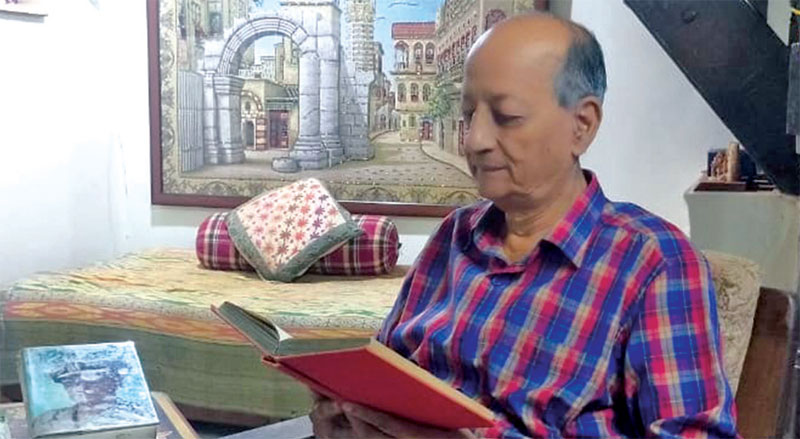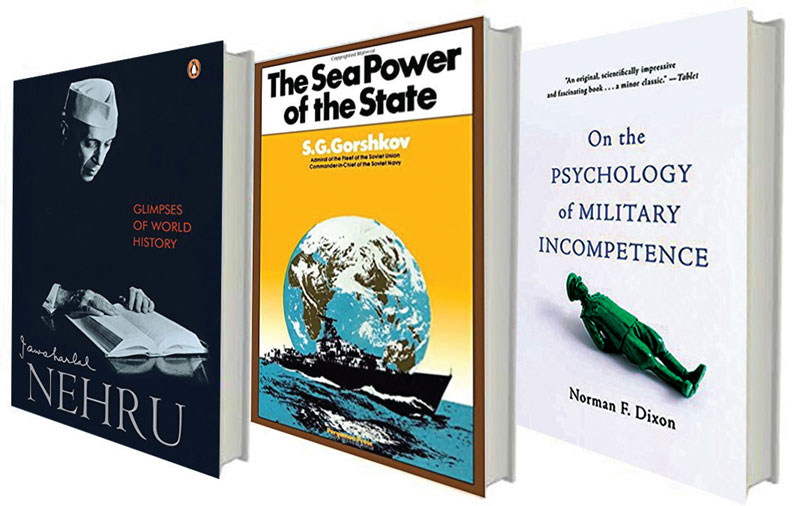Admiral Vishnu Bhagwat
The importance of reading for military officers cannot be overemphasised. During my tenure as the CNS, I had started the practice of every officer reviewing a book which was to be attached to his Annual Confidential Report (ACR). The idea was to ensure that not only each officer read, but also reflected upon what he read. In no specific order, here is my recommendation for must read books for all officers.

- The Officer as a Leader is a remarkable book on military leadership by Samuel Lyman Atwood Marshall (1900-1977), American author and military analyst. The author discusses the psychology of a leader and what it takes to be one. He points out the 13 mistakes that every leader should avoid that are now well known in armies across the world as the Ten Commandments.
- On the Psychology of Military Incompetence is a classic study of military leadership and an original exploration of the battles that have defined the last two centuries of human civilization. It is an essential guide for the next generation of military leaders. The author, psychologist Norman F. Dixon, argues that there is a pattern to inept ‘generalship’, and locates this pattern within the very act of creating armies in the first place, which in his view produces a levelling down of human capability that encourages the mediocre and limits the gifted. In this light, successful generals achieve what they do despite the stultifying features of the organisation to which they belong.
- Sea Power of the State is written by Admiral of the Fleet Sergei G. Gorshkov and was published in 1976 during his tenure as the Soviet Navy’s Commander-in-Chief. It provides a rarely available view into strategic thinking which guided the development and disposition of Russian naval forces during the 1960s and 1970s. That was the first time Russia possessed naval forces capable of conducting sustained operations on the world’s oceans—albeit with a fleet relying primarily on submarines and long range missiles.
- Elephants and Grasshoppers is written by Australian journalist (and author of many books) Wifred Burchett. The book takes the reader through the fascinating account of the battle of Dien Bien Phu in 1954 then under occupation of France. The book narrates how they were trapped by tunnel warfare and defeated in a great battle. Eventually, the French had to surrender and withdraw from the country, which was divided into north and south Vietnam. Then onwards to the new phase starting 1956 when the strategy of Ho Chi Minh and General Nguyen Vo Giap led on to fight the famous Vietnam war where artillery guns and war materiel were transported on bicycles and carts to the south. The book sums up the war as, ‘You cannot be victorious against an Enemy who refuses to be defeated’.
- Russia at War 1941-45 by Alexander Werth is an authoritative account of the Red Army defeating Nazi Germany and marching to Berlin. The Nazi Germany had launched a surprise invasion of the Soviet Union under ‘Operation Barbarossa’ with nearly 80 per cent of its military wherewithal: tanks, Luftwaffe aircraft and artillery. Werth records the great defensive and offensive campaigns of the Red Army under Marshal Zhukov. Incidentally, Marshal Zhukov visited India in 1956. In addition to his main programme, he visited the National Defence Academy at Khadakvasla and demonstrated a bayonet charge to Commandant Maj. Gen. E. Habibullah leaving the Army Training Team spellbound.
A Quick List
- Glimpses of World History by Jawaharlal Nehru is a must read for every public servant, civil and military, to appreciate our current world and the forces of history that influenced nations.
- The David Divine trilogy on military is an eye opener. Defence correspondent for the Sunday Times (London), Divine wrote The Blunted Sword on the British Army and The Broken Wing on the Royal Air Force. Both books severely criticised the British ministry of defence, castigating the senior military leadership of obstructing their Services from induction of war-winning ideas and remaining fixated on weapon platforms in the 20th Century. He also wrote a book on the Royal Navy, the name of which I can’t remember right now.


